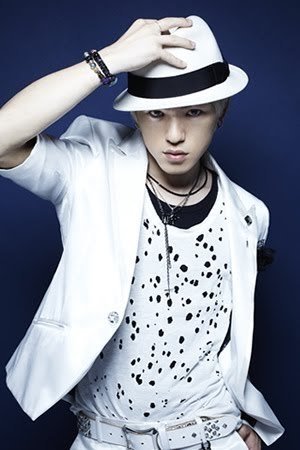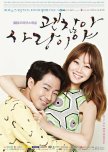It's Okay, That's Love is not what it looks like. Or sounds like, for that matter. Ji Hae Soo (Gong Hyo Jin) is a psychiatric doctor in training. She's extremely familiar with mental disorders, as she herself has one. She's terrified of physical intimacy thanks to a trauma from her past involving her mother, and has never had sex, not even with the guy she's been dating for 300 days. This sounds like a challenge to player/writer Jang Jae Yul (Jo In-Sung), who has moved into Hae Soo's boarding house, which he owns, while his own apartment complex is under construction. Also living in the house is fellow psychiatrist Jo Dong Min (Sung Dong-Il), and Tourette's patient Park Soo-Kwang (Lee Kwang-Soo). Jae Yul figures living with this strange bunch of weirdos might help him write his newest crime novel.
That's the surface story, and it's the one you think is going on for a good chunk of the first third of this drama. But it's not all their is to it. Jang Jae Yul is hiding an extremely traumatic past: his older brother Jang Jae Beom has been in prison for 14 years for killing their abusive stepfather, and three years earlier Jae Beom escaped from prison and attacked Jae Yul, stabbing him, at a public event. Jae Beom claims Jae Yul is the real murderer, and vows to get his revenge on Jae Yul - who is shockingly blasé about the whole affair, and doesn't blame Jae Beom for anything.
This subplot is introduced very early on in the story, and left me feeling kind of twisted as I watched. I enjoyed the housemate bonding adorableness, Jae Yul taking no shit from holier-than-thou Hae Soo, all of that, but it was all covered in a kind of murky darkness because of Jae Yul's past. I couldn't figure out, upon beginning to watch, how two radically different stories were going to have to do with each other.
But sticking it out is so worth it. I won't get into everything that happens, of course, but I deeply appreciate this drama on so many levels. It is worth all of the hype for its cute and its maturity, all rolled into one.
Mental illness is a big part of this story, and the way it is handled is very different from how we see it in American television and film. As the drama advertises, most of the treatments shown in the drama are fictional, but based in real medicine. Still, the moral concepts that the drama brings up about people with mental illnesses was so refreshing. For example, one of Hae Soo's old crushes is now married to a woman with schizophrenia. Their relationship, while troubled by the illness, is nevertheless one of love, support and happiness. Though side characters, they're used to represent what is possible in terms of mental health, and how love can do wonders as a support for (and not instead of) treatment.
Similarly, Soo Kwang's Tourette's is never played for gimmicks - he has an illness, he's matter-of-fact about it, but it isn't part of his story line - it's just the reason he lives with two psychiatrists. Instead, he gets to be bros with Jae Yul, and asks him often about dating advice, and is just generally my favorite character of the bunch with how positive he is.
Disability also comes up in this story. Part of the reason Hae Soo is so hesitant to have physical intimacy with another person is because of her parents' relationship. Her father's unidentified illness has left him in a wheelchair and mentally disabled. Though the entire family is positive about it, treats him well, and generally love him a lot, Hae Soo knows her mother had an affair, and that has affected how she thinks relationships can or cannot work when one partner is otherwise abled, or mentally ill. Seeing the way Hae Soo's relationship to this belief develop and change over the course of the drama was a definite highlight.
I was very worried going into this drama, as someone with a mental illness, how they would portray the struggles to get well and stay well. I was not disappointed in the least. Though some of their treatments aren't exactly real (there's a patient-of-the-week format in each episode where we see someone that one of the psychiatrists is treating), they're nevertheless overflowing with positivity in an attempt to change the way people look at mental illness, and the mentally ill.
And then there's Hae Soo and Jae Yul, who are adorable. I was on board with Jae Yul (despite him seeing Hae Soo as a kind of challenge at first, which was icky) when, after Hae Soo splashes him in the face with wine, he does it right back. It's such an unusual thing to have such equality in the lead male-lead female dynamic, and just that on scene completely hooked me. Jae Yul is such a mess, but such a lovely mess, and Hae Soo pretends she's got her shit together, but she's hiding her own mess, and I love them to bits.
It's also got a killer catchy soundtrack. I found myself whipping out my phone to Shazam a song that was playing many, many times. So good!
I definitely think this drama is worth watching, though it does come with plenty of obvious trigger warnings. I loved everything about it. The cast is wonderful, the storyline a mix of cute and heartbreaking, but nevertheless filled with a hopefulness that was so completely refreshing to see. A+.
Esta resenha foi útil para você?




















